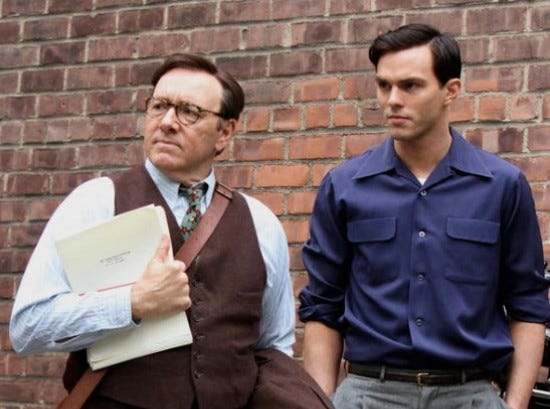Rebel in the Rye

"I sometimes wish I’d never written it. It’s made me a prisoner. I’m shackled by my own creation." --Jerry Salinger
This will be just a very quick and shorter review. The film's release was moved up suddenly, and the studio was only able to supply me with a screener at the last minute. I always prefer to give full-length, well-thought analyses of new films, but the limits of the distribution / marketing system — not to mention my own numerous obligations — sometimes prevent that.
But journalists, as opposed to authors, understand that sometimes it is better to publish something quickly dashed off than nothing at all.
"Rebel in the Rye" is a biopic of "The Catcher in the Rye" author J.D. Salinger from about ages 20 to early 40s, after which he never published another word and became a virtual recluse.
As played (very well) by Nicholas Hoult, Salinger — "Jerry" to his friends, "Sonny" to his family — was an angry young man who understood better than others that his sort of anger is just not sustainable over the course of a lifetime. "Catcher" was published when he was barely into his 30s, very young to be dubbed "the next great American novelist," but already struggling to grasp the angst that drove him as a teen.
The film, written and directed by TV veteran Danny Strong, based on a biography by Kenneth Slawenski, has essentially two halves. The first is about Salinger's relationship with Whit Burnett, the legendary Columbia writing professor and editor of Story magazine, who discovered and shaped many of the 20th century's greatest literary voices. They start as antagonists, gradually evolve into mentor / student, followed by friendship and estrangement.
It's another knockout performance by Kevin Spacey, who has the rare ability to utterly disappear into a character. A frumpled, boozy, distracted man, his Whit recognizes raw talent when he sees it, but also knows that great writers have to be willing to sacrifice everything for their craft. When you're willing to spend your whole life typing and never be published, he tells Jerry, then you'll know you're meant to be a writer.
The second, less effective portion of the film is about Salinger's wartime experiences that left him fractured and unable to write. This is a low-budget film, so there are no depictions of battles or such, just dreamy vignettes of huddling in foxholes, liberating concentration camps, being analyzed and dismissed by Army psychiatrists.
The film tries to shoehorn an untidy life into its 110-minute running time, so Salinger's brief marriage to a German woman gets very short shrift, as does his second marriage to Claire Douglas (Lucy Boynton). They go from meet-cute to courting to raising family to resentment so fast, you'll miss the whole thing if you need a bathroom break.
I did appreciate how the film showcases portions of the writer's life that are less well-known, such as his devotion to Eastern meditation and yoga to help get over his war trauma.
Also popping up are Sarah Paulson as Dorothy Olding, Jerry's agent, who carefully navigates the pitfalls of the publishing game while genuinely caring about him as a person; Victor Garber and Hope Davis as his parents, who reacted to their son's gifts in very different ways; Zoey Deutch as Oona O'Neill, the unattainable girl Jerry woos and loses; and Brian d'Arcy James as the publisher who embraced "Catcher" when everyone else regarded it with befuddlement.
What the movie does best is show the development of Salinger from puckish kid to serious artist, and all the fits and stops along the way. He arrogantly insists that no changes be made to any of his short stories, resulting in a big break with the New Yorker getting shortly before the war breaks out. Later, he finally agrees to meet with their editors and realizes they can actually improve his writing.
Salinger ultimately spent a decade developing the characters, the voice and the perspective that became "Catcher in the Rye." It's a reminder that great art never just springs forth like a thunderbolt from the gods, as most tellings would rather have it.
Usually, cinematic portraits of artists are better at revealing the person rather than their art, but with "Rebel in the Rye" the opposite is true. Salinger elevated his identity as a writer to such an extent that he ceased wishing to be the person he had been before. He shut out everything he felt was a distraction to his writing, which turned out to be ... almost everything.



